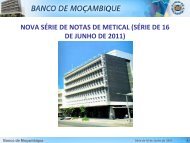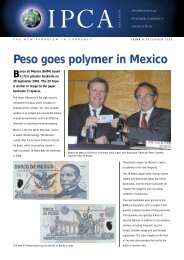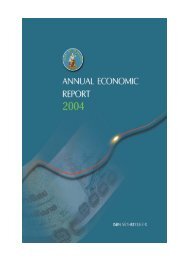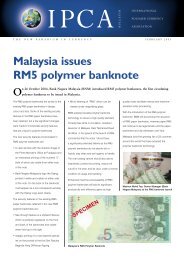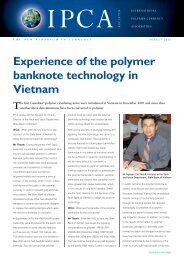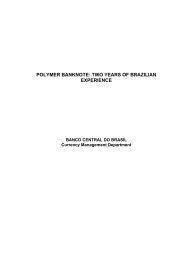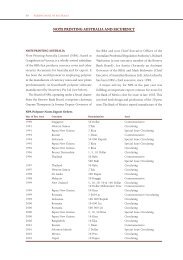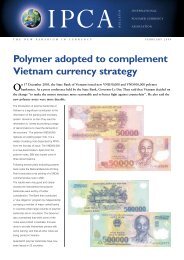ANNUAL REPORT 2008 - Polymer Bank Notes of the World
ANNUAL REPORT 2008 - Polymer Bank Notes of the World
ANNUAL REPORT 2008 - Polymer Bank Notes of the World
You also want an ePaper? Increase the reach of your titles
YUMPU automatically turns print PDFs into web optimized ePapers that Google loves.
innovative firms, and iii) financial modernisationand governance and <strong>the</strong> integration <strong>of</strong> <strong>the</strong>European financial system into global capitalmarkets.ACTING AS A CATALYST FOR PRIVATE SECTORACTIVITIESProgress in European financial integrationdepends to a large extent on private sectorinitiatives aiming to make use <strong>of</strong> <strong>the</strong> existingopportunities for cross-border business. Publicauthorities support such private efforts.In <strong>2008</strong> <strong>the</strong> Eurosystem continued to stronglysupport <strong>the</strong> Single Euro Payments Area (SEPA)initiative, which allows individuals, corporationsand public administrations to make cashlesspayments in euro throughout <strong>the</strong> euro area and<strong>the</strong> o<strong>the</strong>r SEPA countries from a single accountanywhere in SEPA, using a single set <strong>of</strong> paymentinstruments, as easily, efficiently and safelyas <strong>the</strong>y can make <strong>the</strong>m today at <strong>the</strong> nationallevel. SEPA is a move towards an integratedpayments market in Europe which will bringsubstantial economic benefits to society. SEPAis <strong>the</strong> logical consequence <strong>of</strong> <strong>the</strong> introduction <strong>of</strong><strong>the</strong> euro in, currently, 16 countries in Europe.The successful launch <strong>of</strong> <strong>the</strong> SEPA credittransfer in January <strong>2008</strong> marked <strong>the</strong> initiative’sfirst major milestone. Since <strong>the</strong>n, <strong>the</strong> firstbenefits <strong>of</strong> SEPA have materialised for banksand, more importantly, have started to reach <strong>the</strong>end-users <strong>of</strong> payment services. The Eurosystemhas invited <strong>the</strong> operators <strong>of</strong> infrastructures toassess <strong>the</strong>ir SEPA compliance on a regular basis.Most automated clearing houses which processcredit transfers in euro are now compliantwith <strong>the</strong> credit transfer scheme, and several <strong>of</strong><strong>the</strong>m have made <strong>the</strong> step from <strong>of</strong>fering purelydomestic operations towards providing serviceson a pan-European basis. However, as set out in<strong>the</strong> sixth progress report on SEPA issued by <strong>the</strong>Eurosystem in November <strong>2008</strong>, <strong>the</strong> migrationprocess is still too slow and measures should betaken to accelerate it.The SEPA framework for card payments wasalso put in place in January <strong>2008</strong>, but more effortis still needed in this field. The SEPA frameworkfor cards should bring about greater choice andefficiency through <strong>the</strong> gradual elimination <strong>of</strong>legal, technical and scheme-imposed obstacles,as well as through increased competition in<strong>the</strong> fields <strong>of</strong> issuing, acquiring, acceptance andprocessing. The migration to chip cards witha personal identification number (PIN), animportant SEPA building block, advanced wellin <strong>2008</strong>. Several card schemes adapted <strong>the</strong>ir rulesto <strong>the</strong> SEPA requirements. However, doubtsremain about whe<strong>the</strong>r all card schemes haveeffectively separated <strong>the</strong>ir processing activitiesfrom <strong>the</strong>ir scheme management functions. TheEurosystem expects at least one additionalEuropean card scheme to emerge in <strong>the</strong> comingyears which meets its requirements and those <strong>of</strong>cardholders, banks, merchants and competitionauthorities. The Eurosystem has been discussingthis topic with major European banks and o<strong>the</strong>rstakeholders since April <strong>2008</strong>, and has observedincreasing support. Several market initiativesare under way to create such a European cardscheme, which <strong>the</strong> Eurosystem considers to bea clear sign that <strong>the</strong> market recognises <strong>the</strong> needfor a scheme <strong>of</strong> this nature.Preparations continued to be made for <strong>the</strong>launch <strong>of</strong> <strong>the</strong> SEPA direct debit scheme on1 November 2009, resulting in <strong>the</strong> adoption<strong>of</strong> two rulebooks on <strong>the</strong> core and businessto-businessservices. However, uncertaintiesstill surround <strong>the</strong> launch <strong>of</strong> <strong>the</strong> scheme, and<strong>the</strong>se must be resolved urgently, in particularthose related to <strong>the</strong> application <strong>of</strong> a multilateralinterchange fee. To support <strong>the</strong> timely launch <strong>of</strong><strong>the</strong> scheme, in September <strong>2008</strong> <strong>the</strong> ECB, in closeconsultation with <strong>the</strong> European Commission,suggested an interim arrangement wherebyexisting multilateral interchange fees would beapplied to SEPA direct debits. During a transitionperiod, which would only last a few years, bankswould have to change <strong>the</strong>ir business models andinform <strong>the</strong>ir customers in an adequate manner.The Eurosystem continued its efforts to ensure<strong>the</strong> timely launch <strong>of</strong> <strong>the</strong>se new payment servicesat <strong>the</strong> European level. In this context, <strong>the</strong> sixthprogress report on SEPA suggests priorities andencourages fur<strong>the</strong>r work on <strong>the</strong> project.ECBAnnual Report<strong>2008</strong>159


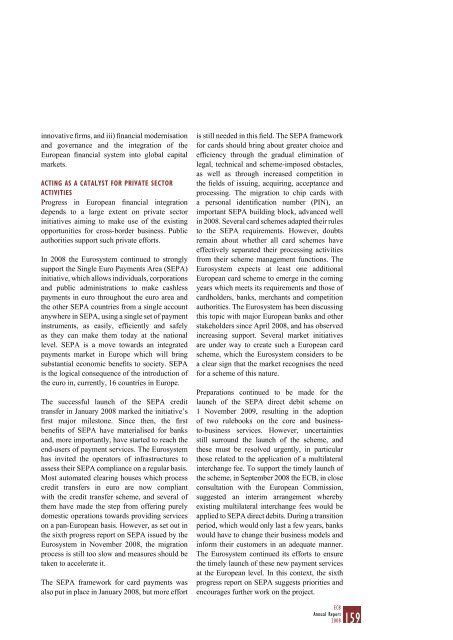
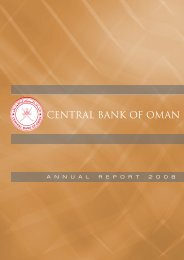
![KNOW YOUR NEW GIBRALTAR BANKNOTES - [Home] bThe/b](https://img.yumpu.com/50890985/1/184x260/know-your-new-gibraltar-banknotes-home-bthe-b.jpg?quality=85)
![PAPUA NEW GUINEA - [Home] - Polymer Bank Notes of the World](https://img.yumpu.com/49758743/1/190x143/papua-new-guinea-home-polymer-bank-notes-of-the-world.jpg?quality=85)

